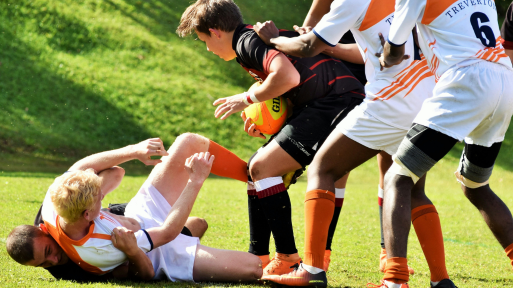 For athletes, maintaining a strong, healthy body is crucial to performing at their best—but what about protecting their teeth? Whether you're a professional athlete or enjoy recreational sports, dental injuries are common risks that come with high-impact activities. The good news is that with proper precautions and dental care, you can protect your teeth and gums, ensuring they stay in great shape while you stay active. In this blog post, we’ll explore key tips for dental care for athletes and the best ways to protect your teeth during sports.
For athletes, maintaining a strong, healthy body is crucial to performing at their best—but what about protecting their teeth? Whether you're a professional athlete or enjoy recreational sports, dental injuries are common risks that come with high-impact activities. The good news is that with proper precautions and dental care, you can protect your teeth and gums, ensuring they stay in great shape while you stay active. In this blog post, we’ll explore key tips for dental care for athletes and the best ways to protect your teeth during sports.
The Importance of Mouthguards
The most essential tool for protecting your teeth during sports is a mouthguard. Mouthguards act as a cushion, absorbing the impact of blows to the face and preventing serious dental injuries like broken teeth, knocked-out teeth, and damage to the soft tissues (lips, cheeks, and tongue). Whether you're playing contact sports like football, hockey, or boxing, or non-contact sports like gymnastics and skateboarding, wearing a mouthguard is a simple and effective way to prevent injuries.
Types of Mouthguards:
- Stock Mouthguards: Pre-formed and ready to wear, stock mouthguards are the least expensive but offer the least protection and may not fit well.
- Boil-and-Bite Mouthguards: These mouthguards are softened in hot water, then molded to fit your teeth. They provide a better fit and more protection than stock mouthguards.
- Custom-Fit Mouthguards: Made by a dentist based on an impression of your teeth, custom mouthguards offer the best fit and protection, although they are the most expensive option.
For optimal protection, athletes should invest in a custom-fit mouthguard, especially if they participate in high-impact sports.
Preventing Dental Injuries
In addition to wearing a mouthguard, there are other ways athletes can protect their teeth and gums during sports.
1. Wear a Helmet
Helmets protect not only your head but also your mouth, teeth, and jaw. In sports where facial injuries are common—such as football, hockey, and cycling—wearing a properly fitted helmet can reduce the risk of traumatic dental injuries.
2. Stay Hydrated
Dry mouth can increase your risk of tooth decay, as saliva helps wash away bacteria and food particles. Athletes are often prone to dehydration, especially during intense physical activity. Drinking plenty of water helps keep your mouth moist and reduces the risk of decay, especially if you consume sports drinks, which are often high in sugar.
3. Limit Sugary Drinks and Snacks
Sports drinks and energy bars are common in the world of athletics, but their high sugar content can be harmful to your teeth. Try to limit sugary snacks and drinks and opt for water and healthy snacks like fruits and nuts, which support both your oral and overall health.
Post-Game Dental Care
After playing sports, make sure to follow a good oral hygiene routine to keep your teeth strong and healthy:
- Brush and floss: Brush your teeth with fluoride toothpaste at least twice a day and floss daily to remove plaque and food particles.
- Rinse your mouth: After consuming sugary sports drinks or snacks, rinse your mouth with water to help wash away sugar and acid.
- Replace your mouthguard regularly: Mouthguards wear out over time. Check for signs of wear and tear and replace them as needed.
Conclusion
Dental care for athletes goes beyond regular brushing and flossing—it's about taking proactive steps to prevent injuries and protect your smile. Wearing a mouthguard, staying hydrated, and being mindful of your diet are key to maintaining healthy teeth while participating in sports. And don't forget to visit your dentist regularly to ensure your oral health is in top shape: Schedule an appointment today.

